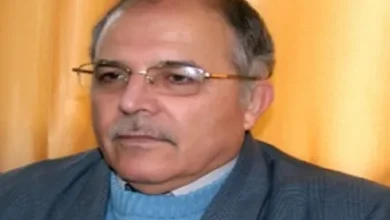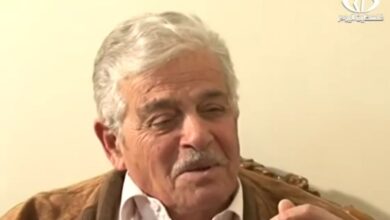Settlement of the Kurdish problem- Ibrahim Ebeid. Article 2 WHAT IS THE MARCH MANIFESTO
?WHAT IS THE MARCH MANIFESTO

Settlement of the Kurdish problem
Ibrahim Ebeid.
Article 2
WHAT IS THE MARCH MANIFESTO?
More than two and a half years have now elapsed since the declaration of the March Manifesto. During that period, a lot has been written and said about the Manifesto, not only in Iraq but also in the Arab region and in the world at large. Nevertheless, we think it may be useful to pose this question:
What is the March Manifesto?
Raising this question should not imply that the Manifesto is ambiguous and needs explanation. Nor should it mean an attempt to give a new explanation to the Manifesto in light of the happenings of the last two and a half years.
The idea is only to set a basic criterion, or a number of basic criteria, to which all should refer when viewpoints differ and when interpretations conflict. To this aim must be added a fact that is unavoidable to admit, namely: the political realities of our country and the Kurdish question in particular, always necessitate emphasizing axiomatic matters.
Then, what is the March Manifesto?
The elucidation we present here expresses our concept of the Manifesto before it was declared, at the time of its declaration, after its declaration, and in the future too.
In our opinion, this concept formed the basis of the dialogue that passed among us and the leadership of the Kurdish Movement and the KDP before the declaration of the Manifesto. We also hold that our understanding of the Manifesto is identical to that reached by the Iraqi nationalist, national and progressive forces and by progressive friendly forces throughout the World.
To cut a long story short, we can sum up our concept of the March Manifesto in the following:
The March Manifesto is a political document vide which the revolutionary authority binds itself before the people to realize the legitimate national rights of the Kurdish people, including self-rule, within the framework of the Iraqi Republic and to achieve the equitable and full participation of the Kurdish people in all the affairs of the country.
On the other side, the document requires the Kurdish Armed Movement and the KDP, both led by Mr. Mustafa al-Barzani, to end the exceptional conditions that prevailed before the declaration of the Manifesto, together with concomitant effects, manifestations, and establishments.
It also requires functioning on the basis of the unity of the homeland, the country’s constitution and legal institutions, the alliance between the ABSP and KDP, and consultation between the two parties.”
Immediately after the announcement of the Manifesto, on March 3, 1970, the leadership of the Kurdish Movement and the KDP announced their support to it and declared, before the people, their commitment to honor their part of the liabilities and responsibilities as stipulated by the Manifesto.
Therefore, one can say that the March Manifesto is comprised of these two very closely interlinked basic issues:
Guaranteeing the legitimate rights of the Kurds.
Strengthening the unity of Iraq, that is, the unity of the people, the homeland, and of the constitutional system in accordance with the logic of the supremacy of law and centralization of authority.
Thus, the Manifesto included certain responsibilities to be carried out by the Iraqi government alone and others to be shouldered by the Kurdish Movement and the KDP alone. In addition, it contained common responsibilities to be carried out by the two parties together, within the framework of joint action and mutual full adherence to peace and national unity.
It is common knowledge that the enforcement of the clauses of the Manifesto is no easy task. Many difficulties, problems, and differences, naturally, stand in the way of this task. This is a reality that existed during the last two and a half years that followed the Declaration of the Manifesto, and that continues to exist now. Therefore, it must neither be denied nor concealed.
The responsibilities entrusted to the government solely are tied up, in one form or another, with those bestowed on the Kurdish Movement and the KDP, and vice versa. There are, too, the tasks whose implementation requires joint action by both parties. All, and each, of these matters, involve many interpretations, complications, and varying viewpoints.
That this is a tangible and agonizing fact, should not give rise to despair or lead us into a wilderness. However complicated the interpretations and disagreements might be certain guiding basic criteria will always remain valid and handy. They can safely be relied upon in the judgment of failure and success and retreat and progress in all spheres.
We think that the principal criterion for measuring what had actually been realized from the targets of the Manifesto during the last phase, together with the targets that ought to be achieved now or tomorrow, is an objective and honest comparison between the commitments being attained by the authority of the Revolution and those being accomplished by the leadership of the Kurdish Movement and the KDP.
This is the real objective and fair criterion, we believe because it emanates from the substance of the March Manifesto itself and from the nature of the peaceful and democratic settlement to the Kurdish question whose success, needless to remind, is everybody’s responsibility.
Should we be obliged to enumerate the commitments we have honored today, this must not be construed as an act of boasting or as cornering the other side in a state of dereliction. Our intention is,, to expound our viewpoints and attitudes and to acquaint the people with the real situation in the country as we conceive it; simultaneously urging sincere citizens to speed up their efforts and conquer all obstacles to enable either party to fulfill its obligations and responsibilities.
Likewise, we do wish that our brothers in the KDP follow suit and tell the people of the commitments and duties they had accomplished concerning the Manifesto, which they had supported and adopted. Meanwhile, we do want to hear, and to have the people informed, of what the KDP and the Kurdish Movement think we are required to carry out of the Manifesto’s stipulations today, or tomorrow.
Whatever the attitude of the KDP might be, the March Manifesto, in the conviction of the ABSP and the revolutionary authority, constitutes a commitment of principle and a policy that conforms to the total sum of the liberating, progressive, and revolutionary line followed by them in leading the country.
The responsibility and commitment of the KDP towards the Manifesto can be judged by the role it plays and intends to play in the future, in its capacity as a partner in the political power, in the interest of the national cause of the Kurdish people and in the interest of the entire country.
Below is a list of the commitments and duties about the Manifesto which, we believe, have been carried out by the government of the Revolution and by the ABSP:
1. Amending the Interim Constitution to affirm the national presence of the Kurds by the March Manifesto.
2. Taking legal measures to ensure the recognition of the Kurdish language, side by side with Arabic, as an official language in the areas where the majority of the population is Kurdish. (The Kurdish language has already become the language of instruction in these areas.)
3. Participation of Kurdish brothers in the government, public posts, and in planning boards.
4. Appointment of Kurdish officials in the administrative units inhabited by a majority of Kurds, or by citizens mastering the Kurdish language.
5. Passing out new regulations for the Directorate of the Kurdish Scholastic Affairs as part of effecting comprehensive changes in the Directorate to make it competent in discharging its responsibilities.
6. Renaming schools after historic, geographical and patriotic Kurdish names.
7. Providing public libraries and schools with Kurdish books.
8. Appointment of large numbers of teachers in schools where teaching is conducted in Kurdish.
9. Creation of a Directorate for Kurdish Culture in the Ministry of Information.
10. Establishment of al-Tadhamon Kurdish Printing and Publishing House.
11. Publishing of a Kurdish magazine “Bayan” and a Kurdish newspaper “Hawkari” by the Ministry of Information.
12. Permitting the publication in Kurdish language newspapers and magazines, such as “Brayati” “Berinoa”, “Shams Kurdistan” and “Estera”.
13. Increasing Kurdish programs at the Kirkuk TV Station.
14. Licensing the Kurdish Cultural Society
15. Founding the Union of Kurdish Writers
16. Permitting the formation of exclusively Kurdish students, youth, women, and teachers organizations.
17. Reinstating students who were dismissed, or compelled to leave school, because of violent conditions in their former schools and institutes, regardless of age restrictions.
18. Pardoning all prisoners (civilian and military) convicted by competent courts on account of the incidents of the North.
19. Appointment of teachers and dressers graduating from non-regular courses.
20. Reinstatement to the service of all Kurdish workers, officials, and employees (civilian and military alike) without abidance with the cadre restrictions and regardless of the extent of their contribution to the acts of violence in the Kurdish area.
In addition to this, special orders were issued by the President of the Republic and by his Deputy reinstating, as an exceptional case, a large number of military and civilian personnel, despite the lack of any relation between their cases and the incidents of the North. This was in response to the personal wishes of the KDP and Mr. al-Barzani.
21. Allotment of pensions to the families of the martyrs and the victims of the regrettable incidents of the North and payment of their salaries as of May 1971.
22. Exonerating all Kurdish military men, who deserted the service because of the incidents of the North, from responsibility for the weapons, equipment, and supplies that were in their custody.
23. Exempting all Kurds who had participated in the incidents of the North from both conscription and cash payment instead of that.
24. Appointment of 6,000 demobilized Peshmargas as frontier guards in 12 regiments. A special law was enacted, considering them as part of the Iraqi armed forces.
25. Allocation of 50,000 Dinars monthly to 5,000 demobilized Peshmargas (ID. 10 each per month) pending absorption of them in suitable jobs.
26. Allocation of between 30-50 thousand Dinars, monthly, to the headquarters of Mr. Al-Barzani.
27. Counting the worker’s period of absence from duty, during the fighting, towards pension and social security. The period of absence of the officials and employees, both civilian and military, who participated in the incidents, was also counted towards increment, promotion, and pension.
28. Passing a special resolution regarding the Kurdish farmers, which failed to settle their debts to the agricultural bank because of the incidents in the North?
Vide this resolution, they can be granted extra new loans (not restricted by the ordinary ceiling), which are sufficient to enable them to settle their old debts and resume their agricultural activity.
29. Commencing agrarian reform in the Northern area despite the obstructions placed in its way.
Agricultural and livestock projects have also been accomplished.
30. Drawing up the economic plan (centrally and self-financed) in a pattern ensuring the balanced development of the Iraqi backward regions, taking into consideration the standard of backwardness in the Kurdish area.
31. Formation of the North Development Committee, which was furnished with adequate funds for accomplishing projects that ensure compensation to the Kurdish area for the damages it suffered during the past years. (This is over and above the projects approved in the economic plan.)
32. Completion of many projects, especially in housing and services, to compensate the area for the damages and backwardness it sustained. 12,000 houses were built for those who lost their homes during the lamentable hostilities. Many primary and secondary schools, public clinics, health centers, and hospitals were opened. Artesian wells were sunk, modern markets were established and many water and electricity projects were accomplished.
Quite several tourist and summer resort projects were constructed. Recently, approval was given for the establishment of a one-million-Dinar tourist grand hotel at Salah Addin.
33. Regarding the industrialization of the Kurdish area, five manually operated carpet-weaving centers have been established in Arbil, Kwaisinjak, Rawndous, Dohuk, and al-Amadiya. A center for producing wool threads has been built in Arbil. A dairy produce factory has been developed in Arbil and the building of the Arbil carpentry factory has also been completed. The building of a beets sugar mill in Sulaymaniah will soon be completed. The Sarchinar cement factory will be expanded shortly.
A tobacco-blending factory in Sulaymaniah and a poultry farm in Arbil will soon be accomplished.
Furthermore, work is to begin soon on building a wool textile mill in Arbil, a Kurdish dressmaking plant in Dohuk, a big canning factory in Hareer, a tomato paste plant in Dohuk, and a factory for improved cigarettes in Arbil. The Ministry of Oil will soon begin building fuel depots in Sarchinar to cater to the Northern area, particularly the Governorate of Sulaymaniah, with various kinds of fuel. A project for processing marble in Arbil will shortly be presented to the Planning Board.
It is common knowledge that the geographical distribution of the development projects, both centrally and self-financed, clearly shows that the per capita share of the projects in the North is higher than the national per capita share
October 18th. 1972




